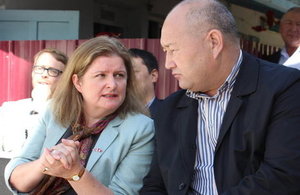British Support to Batken
HM Ambassador visits Batken to review effectiveness of UK aid

On 29 September – 2 October Her Majesty’s Ambassador Judith Farnworth paid her first visit to Batken Oblast. This south-western corner of the Kyrgyz Republic, the country’s newest region, is about to celebrate its 14th birthday. The predominantly agricultural region, bordered by Tajikistan, Uzbekistan and Osh Region, has one of the worst performing economies in the Kyrgyz Republic. Its population of some 500,000 is a diverse mix of over two dozen ethnic groups, including large Kyrgyz, Tajik and Uzbek communities.
The Ambassador held discussions with a range of local figures including the Mayor of Batken Janybek Jalalov, Head of the Batken Oblast Border Guards Kuvatbek Artykbaev and NGO representatives to learn about the current situation in Batken and to hear about priorities for the region’s development. The main focus was on generating economic growth, promoting social cohesion particularly between different nationalities, developing dialogue with neighbours across borders and ensuring stability in the evolving security environment following the 2014 drawdown of ISAF forces from nearby Afghanistan. The Ambassador was struck both by the openness of her interlocutors and their determination to tackle the issues head-on to provide a better future for the oblast’s young population.
On the last two days of her visit, the Ambassador teamed up with Jonathan Veitch, UNICEF Representative in the Kyrgyz Republic, and his colleagues to visit a number of initiatives under the joint DFID/UNICEF Equity programme. The UK Department for International Development has contributed £5 mln to the joint initiative designed to Improve peace and stability and lessen ethnic tension in the conflict affected areas of Southern Kyrgyzstan by raising of living standards, increased employment opportunities and reduced frustration and alienation among the poorest children, youth and families in the Programme target areas. This is just one of a number of UK government funded initiatives to promote prosperity and stability in south of Kyrgyzstan.
In Sambula municipality, they visited a Tolerance Centre shared by Manas and Andarak schools; watched a moving performance of the joint school forum theatre addressing the issue of bullying; and opened a Youth Centre where young people from across the community can develop their employment potential through learning new skills such as English language and computing.
In Batken city, the Ambassador participated in the official opening of a learning facility within the “Tayanych” day care centre, which provides an innovative approach to social protection for children in difficult life situations. The centre, unique in Kyrgyzstan, provides an environment for vulnerable youngsters to learn new skills to improve employment prospects, to reduce the likelihood of their conflict with the law and to promote interethnic tolerance. The Ambassador heard that within the Equity Programme, UNICEF and state and municipal partners had managed to decrease the number of children in conflict with the law by an impressive 70% in Batken District.
The final event in the busy schedule was the official opening of a community-based kindergarten in Yulbana village, Uch-Korgon, which has a population comprising Tajik (65%), Uzbek (18%) and Kyrgyz (12%) and other ethnic groups. This is just one of 61 kindergartens to be opened across Batken, Osh and Jalalabad regions under the Equity Programme in Southern Kyrgyzstan funded by DFID. These CBKs will provide preschool education services to over 5000 children from marginalised and disadvantaged backgrounds.
Kyrgyz officials including Batken Governor Jenish Razakov, mayors, akims and representatives of local councils and members of the local community turned out in force to show their support for the Equity Programme and their gratitude to UNICEF and the British Government.
The visit provided a useful snapshot of the UK government funded activity in Batken Oblast and left some lasting impressions: of the warm hospitality of the people of Batken; of their determination to develop its socio-economic potential; that UNICEF activities under the Equity Programme are delivering tangible improvements to the prospects for thousands of children and young people, and by extension, the broader community and are successfully promoting inter-ethnic tolerance; and that the strong partnership between UNICEF with Kyrgyz authorities (at national, oblast, city, district and village level), civil society and the local community is both evident and pivotal to the continued success of the Equity Programme.